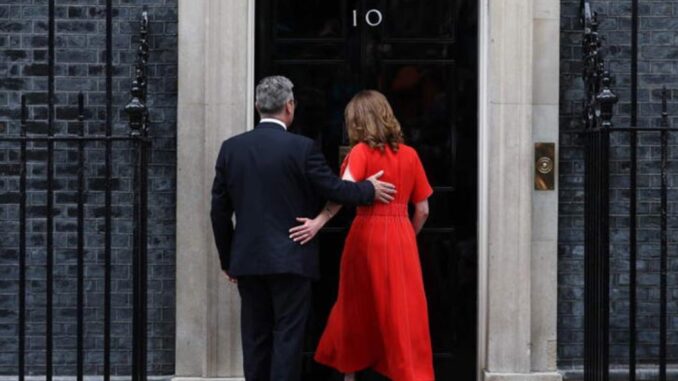
Conservatives are finally gone! The Labour Party will have to respond to the demands for in-depth changes. Better working conditions, salaries, healthcare and housing are put off necessities that cannot wait. We need a new radical and leftist political alternative to put an end to bipartisanship and face the far right.
By Julio Santana – ISL United Kingdom
The Labour Party obtained a clear victory over the Conservative Party, who had the worst defeat in its history. This puts an end to the fourteen years of consecutive anti-popular governments! Liberal Democrats came in third and the fall of conservatives also helped Reform UK, a far-right grouping led by Nigel Farage, who in his eighth run will enter the Parliament for the first time.
Victory and demands
The Labour Party won traditional Conservative strongholds and in Scotland won 37 seats, compared to nine for the SNP nationalists, who slipped back. The Labor Party led by Keir Starmer garnered less support than in its last four victories. In addition, it lost in a number of former strongholds to independent candidates, including some who ran on pro-Gaza platforms and Jeremy Corbyn himself, who entered Parliament. There they will try to co-opt them so that they “understand” the “difficult situation” caused by the previous government and support the measures of the current one as the “less evil” option. Now the Labor Party will have to respond to the demands of the working people to qualitatively improve the deteriorated living conditions.


The day after winning
Successive governments implemented tax breaks that were a charter for fraudsters. A National Audit Office report listed 341 tax breaks ostensibly tasked with promoting economic growth worth £204 billion! Before the election Labour scaled back its £28 billion green investment package and sought to curry favor with business leaders, “promising not to raise the corporation tax or reverse the Conservative government’s decision to remove a cap on bankers’ bonuses.” (Phillip Inman economics editor of the Observer, editor of the Guardian). Add to this the fact that the electricity companies have a total and combined liability of eighteen billion pounds which they expect to be absorbed by the state, with everyone’s money.
National Health Service (NHS) and private business?
In England public health is severely compromised, for example, the waiting list for hospital treatment has soared from 2.6 million (2010) to 7.6 million by (2024). In the face of this, the new Minister for Public Health Care has proposed, “Wes Streeting has defended Labour’s plans to use the private sector to help reduce the backlog of NHS care, arguing that a failure to do so would result in a “betrayal” of working class people who cannot afford to pay for care.” He further posited that his approach is “pragmatic but principled,” taking aim at “middle-class leftists” who “risk putting ideological purity before patient care.” The conservatives have suffocated the public healthcare system and, if measures such as those mentioned above are implemented, it will be the same as “putting the fox to look after the chickens”. Or will the private health companies work for free? Or will patients with less compromised health be referred to private services and those with high complexity to state-dependent care?

The housing drama
In London you pay between 700 and 800 pounds for a room in a shared house and around 1,300 pounds for a one-bedroom apartment, plus utilities, annual tax, transport and food. While average salaries range between 1,400 and 1,800 pounds. There are reports warning that by 2028 the number of children in relative poverty will rise from 30% to 33%, due to the freezing of housing benefit, the end of cost of living payments and the capping of benefits for two children. It also projects that the number of children in overcrowded households will increase from 1.8 million to 2 million (2030) as housing becomes more expensive. The new government needs to implement a plan to build affordable social housing to begin to reverse the serious social problem of homelessness.

Labor, wages and working conditions
The Trades Union Congress (TUC) has “warned the new government that it must urgently address the loss of workers’ pay. Matt Wrack, also general secretary of the Fire Brigades Union (FBU), said that Sir Keir Starmer should convene a summit with the unions within days to plan how a new government would deliver for workers if Labour wins in Thursday’s election. The unions should be invited quickly to set out their priorities” (The Guardian 04/07/2024). In this framework it is imperative to fight for the end of “0” hour contracts, the farce of dismissal with rehiring, demand better working conditions and a wage increase to recover and overcome what has been lost with inflation. The just demands of the 2023 strikes must be met by the government and the bosses.
A new alternative must be built
For years in power, the reactionary conservatives refused to grant the social and democratic rights that working people need. These are injustices that Keir Starmer’s government, which presents itself as “the change” has the opportunity and the obligation to reverse. Of course, we must not normalize the presence of Reform UK because the far right can only worsen the disasters made by the Conservatives.Looking to the future, a reflection is worthwhile: once again, workers went to vote without their own representation, so building it is a great task ahead. From the radical left we have the challenge of laying the foundations of a political unity independent of bipartisanship, in order to dispute the bosses’ and monarchist parties with socialist proposals. The fundamental thing will be to rely fundamentally on independent mobilization and organization. For this reason, the note ends as it begins “No trust in the new government”.








